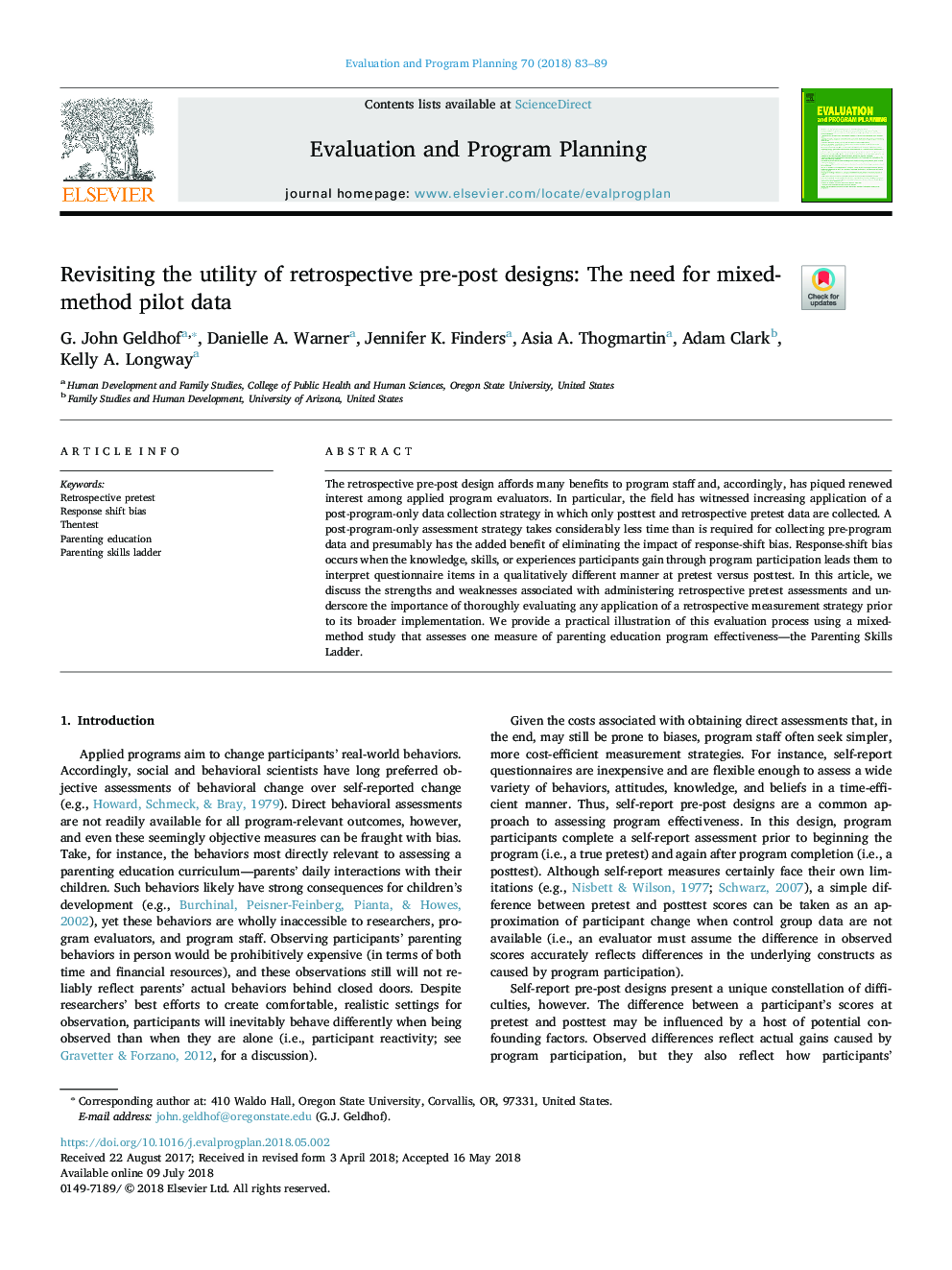| کد مقاله | کد نشریه | سال انتشار | مقاله انگلیسی | نسخه تمام متن |
|---|---|---|---|---|
| 6791977 | 1432699 | 2018 | 7 صفحه PDF | دانلود رایگان |
عنوان انگلیسی مقاله ISI
Revisiting the utility of retrospective pre-post designs: The need for mixed-method pilot data
ترجمه فارسی عنوان
بازنویسی ابزار پیش نویس پیش نویس پیش نویس: نیاز به اطلاعات خلبان متقابل
دانلود مقاله + سفارش ترجمه
دانلود مقاله ISI انگلیسی
رایگان برای ایرانیان
کلمات کلیدی
ترجمه چکیده
پیش نویس پیش نویس پس از آن، مزایای زیادی را برای کارکنان برنامه فراهم می کند و به تبع آن علاقه ای تازه به ارزیابی برنامه های کاربردی دارد. به طور خاص، این زمینه شاهد افزایش استفاده از استراتژی جمع آوری داده های پس از برنامه بوده است که در آن فقط داده های پیش داده شده پس از و پس از آن جمع آوری می شوند. یک استراتژی ارزیابی تنها پس از برنامه صرف زمان قابل ملاحظه ای کمتر از آنچه که برای جمع آوری داده های قبل از برنامه لازم است، و احتمالا دارای مزیت اضافه ای برای از بین بردن تاثیر تغییر تعابیر پاسخ است. تعویض واکنش-واکنش زمانی رخ می دهد که دانش آموزان، مهارت ها یا تجربیات شرکت کنندگان از طریق مشارکت برنامه به دست می آیند، آنها را به تفسیر پرسشنامه ها به روش کیفی مختلف در پیش آزمون و پس آزمون می سنجند. در این مقاله، ما در مورد نقاط قوت و ضعف مرتبط با مدیریت ارزیابی پیش آزمون گذشته نگر و اهمیت ارزیابی هرگونه کاربرد یک استراتژی اندازه گیری گذشته قبل از اجرای گسترده آن بحث می کنیم. ما یک تصویر عملی از این فرایند ارزیابی را با استفاده از یک روش ترکیبی روش ارائه می دهیم که یک معیار اثربخشی برنامه آموزش والدین - نردبان مهارت های والدین را ارزیابی می کند.
موضوعات مرتبط
علوم پزشکی و سلامت
پزشکی و دندانپزشکی
سیاست های بهداشت و سلامت عمومی
چکیده انگلیسی
The retrospective pre-post design affords many benefits to program staff and, accordingly, has piqued renewed interest among applied program evaluators. In particular, the field has witnessed increasing application of a post-program-only data collection strategy in which only posttest and retrospective pretest data are collected. A post-program-only assessment strategy takes considerably less time than is required for collecting pre-program data and presumably has the added benefit of eliminating the impact of response-shift bias. Response-shift bias occurs when the knowledge, skills, or experiences participants gain through program participation leads them to interpret questionnaire items in a qualitatively different manner at pretest versus posttest. In this article, we discuss the strengths and weaknesses associated with administering retrospective pretest assessments and underscore the importance of thoroughly evaluating any application of a retrospective measurement strategy prior to its broader implementation. We provide a practical illustration of this evaluation process using a mixed-method study that assesses one measure of parenting education program effectiveness-the Parenting Skills Ladder.
ناشر
Database: Elsevier - ScienceDirect (ساینس دایرکت)
Journal: Evaluation and Program Planning - Volume 70, October 2018, Pages 83-89
Journal: Evaluation and Program Planning - Volume 70, October 2018, Pages 83-89
نویسندگان
G. John Geldhof, Danielle A. Warner, Jennifer K. Finders, Asia A. Thogmartin, Adam Clark, Kelly A. Longway,
